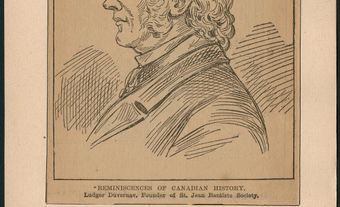This article was originally published in Maclean's Magazine on May 11, 1998
Seinfeld's Swan Song
The scene opens with Jerry, George, Elaine and Kramer standing around at a party. Enter Bania, an unfunny comedian Jerry not-so-secretly hates, who starts talking about this TV show - let's call it Steinfield - and how much he loves it and how it's going off the air and what is he going to do when it's gone? Jerry and Elaine roll their eyes; Kramer turns to tuck into the party snacks. George walks off to hit on a statuesque blond. Finally, Bania leaves, saying something like,"Gotta go - the show starts in 20 minutes."
George (to blond): "My name's Buck - Buck Naked. Pornographic movie star."
Kramer (to no one in particular): "These pretzels are making me thirsty!"
Elaine to Jerry (following Bania with her eyes): "What's up with that?"
Jerry (bored): "Yada yada yada."
OK, so that probably will not be a scene in the too-much-talked-about final episode of Seinfeld, the hit NBC sitcom which is bowing out on May 14 after nine neurotic seasons. But it's hard not to wish that something like it would be in there - some acknowledgment from the always-contrarian Seinfeld clan that all the hype about the end of the show has gotten a little out of hand. In the past few weeks, Jerry Seinfeld (co-creator of his eponymous sitcom along with veteran TV producer Larry David, and master of his comedic domain) has been on the cover of Vanity Fair and Newsweek. His show has been the subject of tribute issues of Entertainment Weekly and TV Guide, while a host of quickie mags, one even published by sometime pornographer Larry Flynt, have been hustled onto newsstands. The network, meanwhile, is expecting audiences in the tens of millions on that fateful evening, and charging advertisers big bucks for the right to peddle their wares during The Biggest Event in the History of Television. "Thursdays will never be the same!" cry the headlines. "Seinfeld forever!" "Jerry's last stand!"
Enough already. Imagine Jerry, Elaine, George and Kramer - respectively played by Seinfeld, Julia Louis-Dreyfus, Jason Alexander and Michael Richards - watching TV in Jerry's New York City apartment and getting all misty-eyed because some program is going off the air. It would never happen. Sentimentality and nostalgia are fodder for other sitcoms - the cast of Friends can't get through an episode without at least one good hug, and Tim Allen's Home Improvement indulges in moral conundrums about parenthood and marriage. None of that for the Seinfeld regulars, who wouldn't know a dewy sentiment if it was somehow transported into their self-absorbed minds. After all, this is - or was - a show whose cardinal rule was "No lessons, no hugs."
American television has long been big on "events," especially when it comes to its top-rated sitcoms. Witness the media circus around the final episode of another NBC show, Cheers, five years ago, or the over-long and dreary finale of M*A*S*H in 1983 - still a historic farewell in the annals of TV, watched by nearly half the population of the United States. Neither of those beloved end-of-an-era shows was very good. With luck, Seinfeld's finale will be better, and avoid the familiar pitfall of taking itself too seriously.
And anyway, TV hit status has always seemed to fit the cast and characters of Seinfeld like an ill-tailored puffy shirt (remember Episode 63?). Compared with the big sitcoms of yesteryear - Mary Tyler Moore, M*A*S*H, Cheers - the show is an anomaly, a sour, absurdist romp where the others were substitute families. Even today, Seinfeld stands out as odd - and oddly un-influential. Other sitcoms have adhered to the safe conventions of the genre, hitting the audience over the head with jokes and emotional "moments." Which raises a question: why is Seinfeld, which runs counter to TV trends and manages to offend as often as it entertains, so popular? Like, what's up with that?
A dissenting voice among the accolades surrounding The End is cultural critic Camille Paglia, who wrote in the on-line magazine Salon that "Seinfeld can go out with an hour-long Hitchcockian focus on a bloody, swirling tub drain, for all I care." The show, she added, "lacks the emotional breadth and timeless, universal appeal of a truly great television series like I Love Lucy." What Paglia fails to point out is that the TV landscape has changed since the 1950s. Now, with dozens of channels on cable and satellite, a TV show can have a relatively small audience and still be a hit - as long as it attracts the right demographic.
For Seinfeld, particularly in the early years, that demographic was young urban males, a group sought after by advertisers, but one also responsible for making Twin Peaks a hit and keeping Star Trek reruns on the air. In other words, the rise of Seinfeld was a cult phenomenon. Look at the way it whined itself into the parlance of younger viewers, any of whom gets the joke when another says "No soup for you!" (from Episode 110, the beloved "Soup Nazi" show) or "hand" (from Episode 31, wherein George complains he has "no hand," or power, in his current romance) or "master of my domain," a euphemism for masturbation from Episode 49, when the four regulars take bets on who can abstain the longest.
The genius of the show lies in the fact that, even as it became a mass Thursday ritual, it stuck to those off-kilter roots, countering and implicitly criticizing the disingenuous moralizing of the '90s. While America elected an I-feel-your-pain president in Bill Clinton, Jerry, George, Elaine and Kramer stubbornly stuck to being pains in the butt. There's Jerry, obsessed with hygiene and at once enthralled and repelled by women. George, the orally fixated nebbish who goes out of his way to indulge his two passions - food and sex - at the same time. Elaine, who can't stop complaining. And Kramer, perhaps the most moral of the bunch, but completely nuts to boot.
The point is, Seinfeld regulars - along with supporters like the oleaginous postman Newman (Wayne Knight) and George's high-strung parents (Jerry Stiller and Estelle Harris) - have remained immune to the demands of "character development." Those irrepressible eccentrics take Seinfeld trademark observational humor and make it hilarious, but also disturbing. Their pettiness and peripatetic fortunes hint at the casual insanity of modern life.
That subversive element is not likely to be found in the tributes and special issues. But finales, and the carefully orchestrated buzz around them, have always been about money, as networks and producers try to eke out the last dollar from a dying franchise. For the rights to advertise during Seinfeld's hour-long farewell, NBC is charging $2 million per 30-second spot. (Global, which simulcasts Seinfeld in Canada, is charging $145,000 per ad.) And then there's syndication. Even as hype over the finale has gained momentum, Seinfeld's distributor, Columbia TriStar, has been negotiating with broadcasters over the rights to its second cycle of reruns (the first cycle ends on May 14). The syndication windfall has been estimated at $2.2 billion, with Seinfeld and David (who left the show after the seventh season, but returned to help write the finale) taking home as much as $280 million each.
That's a lot of money, but still no reason to get too wrapped up in the fin-de-siècle fever going around these days. It all seems so un-Seinfeld-ian. So how to respond to the end of the era? Here's a suggestion: watch the finale, take a deep breath and - like the foursome did when George's fiancée died from licking cheap envelopes - utter a half-muted, bemused "Oh." Then maybe go grab a coffee. Remember that life goes on. And so do reruns.
Maclean's May 11, 1998

 Share on Facebook
Share on Facebook Share on X
Share on X Share by Email
Share by Email Share on Google Classroom
Share on Google Classroom


